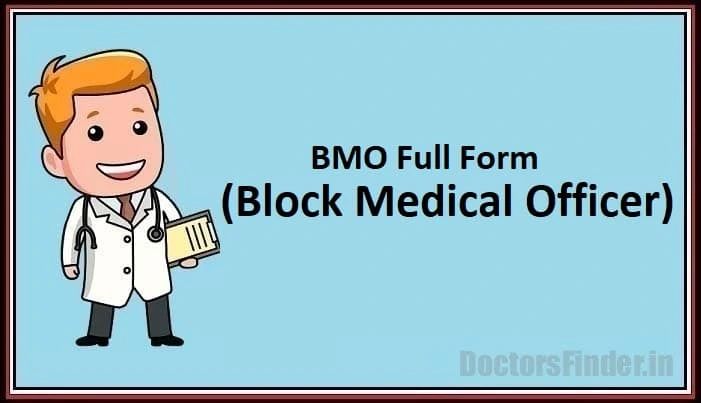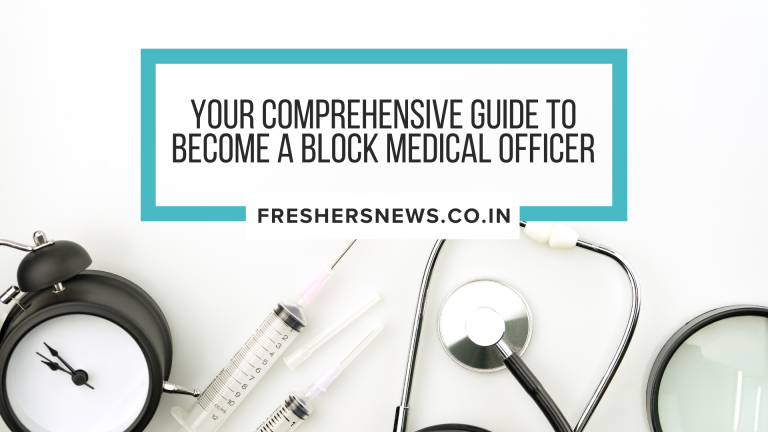Now, you have set your aim to serve in the health sector in Bihar. Ok then, you must plan to qualify for the Bihar Public Service Commission (BPSC) Block Health Officer (BHO) exam, which selects deserving candidates for the BMO post in the state’s healthcare system. This blog will equip you with all the essential information to navigate the BMO confidently. Here, we are talking about Your Comprehensive Guide to Become a Block Medical Officer.

We are discussing Your Comprehensive Guide to Become a Block Medical Officer:
Eligibility criteria
- Educational Qualification-> Possess an MBBS degree recognized by the Medical Council of India (MCI) and a PG Diploma in Community Medicine (DPM) or equivalent qualification.
- Age Limit-> Between 21 and 35 years as of the last date of application (relaxations applicable for reserved categories).
- Domicile-> A resident of Bihar.
For detailed information on specific eligibility criteria for reserved categories and other nuances, refer to the official BPSC notification.
Understanding the Exam Pattern: What to Expect
The BPSC BHO exam comprises two stages:
Stage 1》 Preliminary Exam-> This objective-type test screens candidates’ basic knowledge in General Knowledge, Science, Current Affairs, and Reasoning Ability.
Stage 2》 Main Exam-> This subjective exam assesses candidates’ in-depth understanding of medical and public health disciplines, including Community Medicine, Preventive & Social Medicine, and relevant clinical subjects.
A personality test for shortlisted candidates follows stage 2.
Important Dates
Notification:- October/November
BPSC BHO exam:- December
How to prepare for BPSC BHO
- Understand the syllabus and examination pattern.
It is essential to have a clear concept regarding “what to study?” & “How it will be asked?”
- Create a study plan.
Once you have the perfect materials, you must create a study plan. This will assist you to remain on track and ensure you cover all the crucial topics. Your study layout has to be realistic and achievable, and it is necessary to plan practical time for every analysis of a new topic and revise what you have already learned.
- Self-Study or Coaching
The most common question in students’ minds is how to prepare for the BMO exam and whether to take coaching. The best decision will be a combination of both. Now, BMO is not something you have included in your school curriculum. Therefore, coaching will guide your preparation by providing relevant study materials and tests. Then, you can solve exercises and review materials to study independently.
- Work on fundamentals
Developing fundamental concepts should be prioritized before moving to BMO exam-level questions. So, focus on studying basic concepts and practice easy questions first. Then, gradually move on to higher-level questions.
- Practice lots of questions.
After completing a topic, practice asking as many questions as possible. Move from lower to higher-difficulty questions. Reviewing the concepts a few times through practice can help you prepare for the BMO exam.
- Analysis of test
A practice test is a simulation of the real test. So, as the exam approaches, taking practice tests regularly should be a part of your BMO preparation strategy. Additionally, it is equally important to analyze your simulations and identify your weaknesses.
- Practice regularly
One of the best approaches to put together for the BMO examination is to practice answering questions regularly. You can do this by solving exercise papers and taking mock tests. There are many special exercise papers and mock tests available on the Internet and also in books.
- Stay motivated.
It is essential to be stable, active, and motivated throughout your preparation.
- Focus on your weak areas.
As you start answering questions, you will perceive your weak areas. Once you know your weak areas, you can focus your research on these topics. You will additionally need to get additional exercise material for these topics.
- Stay up-to-date on current affairs.
The BMO examination also asks for current affairs. Therefore, it is essential to be updated on modern events. You can use newspapers, observe information channels, and follow information websites and social media pages to be updated.
About the syllabus of the BPSC BHO exam
Stage 1》 Preliminary Exam Syllabus
- General Hindi-> Comprehension, Grammar, Vocabulary, and Writing Skills.
- General Studies I-> Indian Polity, History, Geography, Economy, Science & Technology, and Current Affairs.
- General Studies II-> Mental Ability & Reasoning, Logical Reasoning, Analytical Ability, Decision Making, and Problem-Solving.
Stage 2》 Main Exam Syllabus
Part-I-> Compulsory Paper:
- Community Medicine (Preventive & Social Medicine)-> Epidemiology, Biostatistics, Health Education, Family Welfare, Environmental Health, Nutrition, Occupational Health, and Program Management.
- General Medicine & Surgery-> Clinical diagnosis, Management of common ailments, and Basic Surgical Procedures.
- Gynecology & Obstetrics-> Antenatal care, Normal deliveries, and Basic Obstetric Emergencies.
- Pediatrics-> Child Health, Immunization, Common Childhood Diseases, and Management of Emergencies.
Part-II-> Optional Paper (Choose one)
- English Literature-> Poetry, Prose, Drama, and Literary Criticism.
- Hindi Literature-> Poetry, Prose, Drama, and Literary Criticism.
- Urdu Literature-> Poetry, Prose, Drama, and Literary Criticism.
- Sanskrit Literature-> Poetry, Prose, Drama, and Literary Criticism.
- Chemistry-> General Chemistry, Organic Chemistry, Inorganic Chemistry, and Physical Chemistry.
- Physics-> Mechanics, Optics, Electricity & Magnetism, Thermodynamics, and Modern Physics.
- Biology-> Botany & Zoology (including Human Anatomy & Physiology).
- Other Optional Subjects-> History, Geography, Economics, Political Science, Public Administration, Psychology, Sociology, and Law.
Which books do you prefer for the BPSC BHO exam
General Hindi:
- Samanya Hindi by Brij Kishore Prasad Singh
- Lucent’s Hindi Samanya Gyan (Hindi)
General Studies I:
- NCERT Textbooks (Class 6th to 12th) for History, Geography, and Economics
- India After Independence by Bipan Chandra
- Manorama Yearbook
General Studies II:
- Verbal and Non-Verbal Reasoning by R.S. Agarwal (
- Quantitative Aptitude by R.S. Agarwal (
- Logical Reasoning by Arun Sharma (
- Community Medicine (Preventive and Social Medicine): Park’s Textbook of Preventive and Social Medicine by K. Park
- Essentials of Community Medicine by John E. Dunn
- Handbook of Community Medicine by Rajesh Khanna
General Medicine & Surgery:
- Harrison’s Principles of Internal Medicine
- Bailey & Love’s Short Practice of Surgery
- Oxford Handbook of Clinical Medicine
Gynecology & Obstetrics:
- Williams Obstetrics by Cunningham, Leveno, Bloom, & Fraser
- DC Dutta’s Textbook of Obstetrics
- Shaw’s Textbook of Gynaecology
Pediatrics:
- Nelson Textbook of Pediatrics
- Avery’s Neonatology: Pathophysiology & Management
- Ghai Essential Pediatrics
Common mistakes to avoid in BPSC BHO
- Not analyzing the examination pattern, questions, and syllabus-> it is important to make a clear concept regarding the study program and which type of topics to focus on.
- Not managing time effectively-> Time management is essential in any competitive exam.
- Not practicing regularly-> One of the excellent methods to put together for the BMO examination is to practice answering questions regularly.
- Making common mistakes-> In any competitive exam, it is crucial to concentrate and keep away from making careless mistakes.
- Not focusing on weak areas-> As you practice answering questions, you will become aware of your weak areas.
FAQs
What is the selection procedure after the written exam?
After the written exams (preliminary and main), shortlisted candidates will face a personality check, i.e., an interview by a committee of experts. This takes a look at assessing your talking skills, personal skills, and suitability for the position of B M O. Scoring properly in the interview round is essential for the selection.
What are the career possibilities after clearing the BPSC BHO exam?
You may be appointed as a BMO in the Bihar health department upon selection. This position includes turning in principal healthcare offerings in rural communities, managing medical programs, and supervising medical workers. You can promoted to greater positions inside the branch or pursue a similar specialization in public health or medicine.
What are the challenges faced by BMOs in Bihar?
Working as a BMO in Bihar can be difficult due to confined resources, infrastructure, and manpower. You might face problems like insufficient equipment, drug shortages, and an excessive burden. However, your dedication and problem-solving capabilities can have a big impact on enhancing healthcare access and its consequences in rural areas.
Is there any age restriction for applying for the BPSC BHO exam?
The age limit for the BPSC BHO examination is 21–35 years. However, there are relaxations for reserved classes (OBC, SC, and ST) and differently-abled individuals.
What are the salary & benefits provided to BMOs in Bihar?
The basic pay of BMOs in Bihar is ₹43,100 to ₹54,990 per month. You’ll get a constant monthly salary, housing allowance, transportation allowances, and pension upon retirement.
Conclusion
In conclusion, qualifying for the BPSC BHO examination needs a well-planned approach, dedication, and a positive mindset. By familiarizing yourself with the syllabus, selecting the best learning materials, preparing consistently, and managing common mistakes, you can enhance your chances of success. Remember, this examination is your gateway to a pleasurable profession as a BMO, working in an essential function in enhancing healthcare access and consequences in Bihar’s rural communities. So, remain focused, believe in yourself, and start your journey to becoming a BMO!

